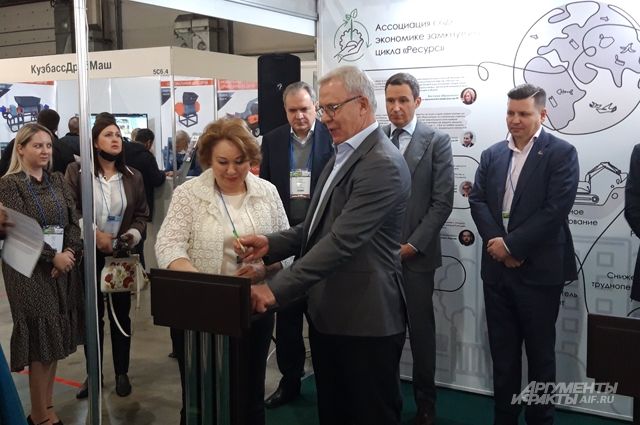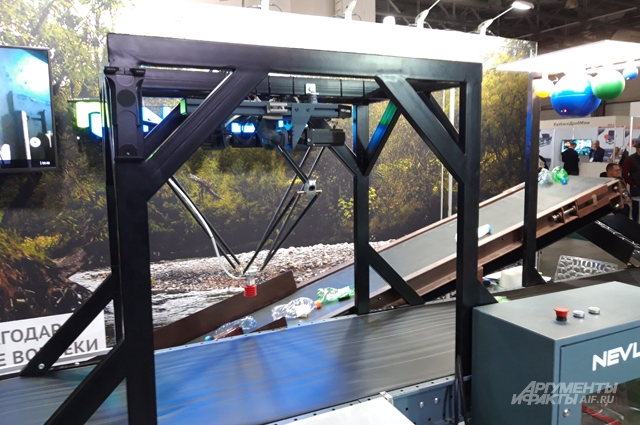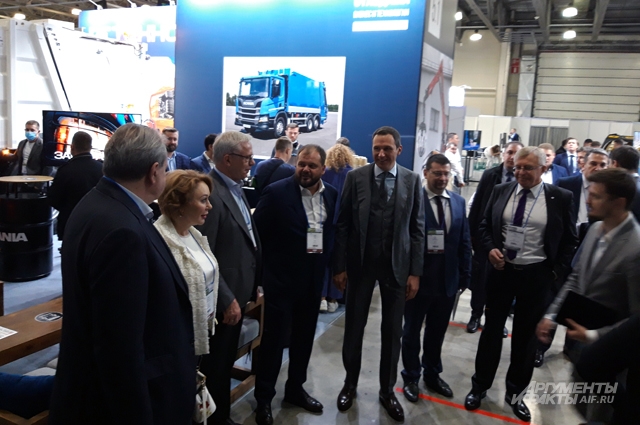
In Moscow during the exhibition “ WasteTech-2021 & # 39; & # 39; Executive Director of the Association for the Promotion of the Resource Circular Economy; Albina Dudareva signed agreements on interaction with the leaders of the Association “ League of Waste Paper Recyclers '', “ Rusl. Kom & # 39; & # 39 ;, & # 39; & # 39; National Joint Council of Enterprises in the Glass Industry '' Steklosoyuz ', as well as with the All-Russian Society for the Conservation of Nature.

Exhibition “ Waste Tech 2021 & # 39; & # 39 ;. Photo: AiF/Nikolay Terechchenko
“ Our task & # 39; & # 39; to unite the efforts of all recyclers to make the Russian economy a true circular economy. Much has already been done in this direction, but much remains to be done. The recycling of waste in our country still does not exceed 10% of the total. Almost 10 years have passed since the first decisions on reforming the DSM management industry were taken, but the systemic treatment of useful waste fractions into useful new products has yet to come. been established. There are individual success stories, there are separate regions and companies where this is happening, but, & nbsp; in general, & nbsp; admit it, this reform is stagnating. From then on, the creation of the Association & bdquo; Resource & ldquo; & mdash; this is another step that should give a boost to the development of the DSM processing industry. We must take the best practices of recyclers of waste paper, glass, scrap metal & nbsp; and transfer them to other domains & mdash; plastic, used batteries and other types of waste. It is necessary to solve the problems at the legislative level, and at the level of the government of the Russian Federation, and at the level of the governments of the constituent entities of the Federation, and, of course, it is impossible to do without control in this matter complex & # 39; & # 39 ;, & mdash; Albina Dudareva said before signing the agreements.
Nature defends itself
After visiting the exhibition of equipment and technologies related to recycling and waste disposal, a review of new products in the field of recycling, experts and media were invited to participate in the plenary session of the forum “ Modern environmental technologies '' mdash; vector of sustainable development & raquo ;. & nbsp;

Exhibition of equipment and technology. Photo: AiF/Nikolay Terechchenko
& Nbsp; Valery Fadeev, Advisor to the President of Russia, Head of the Presidential Council for the Development of Civil Society and Human Rights … He drew attention to the fact that today's society all over the world is facing a serious dilemma & mdash; on the one hand, & nbsp; is rampant consumption, causing indisputable damage to the environment, and on the other hand & mdash; nature is actually pushing back human civilization in the form of obvious climate change, cataclysms such as snow in Texas, unprecedented flooding in Central Europe, terrible fires in Russia, Greece, California, Australia. “ Maybe it's worth thinking about how to keep consumption to reasonable limits, so that we don't spend so much energy on our whims? Why do you need 500 horsepower in an urban environment? Maybe we can do without plastic straws for soft drinks? Perhaps we will finally learn, not in words, but in practice, to transform the waste that we produce ourselves into useful products or ingredients? All of these are in fact already rhetorical questions that require an immediate solution & # 39; & # 39 ;, & mdash; said Valery Fadeev.
Vyacheslav Fetisov, United Nations Goodwill Ambassador, President of the All-Russian Society for the Conservation of Nature argued V. Fadeev: “ When we spoke with the President of Finland on the topic of waste recycling, he said: & nbsp; to put things in order in this area, to make the country clean, it took 30 years for Finland. Folks, we don't have those thirty years! Nature is ruthless. All the tasks related to protecting the environment, recycling waste and reducing the greenhouse effect of emissions, we will have to solve them literally in the years to come. Last year I was in Antarctica again. There is water and puddles everywhere. The continent is melting. If this process continues, it will affect 80% of humanity. & # 39; & # 39;
Exchange of experience
Many scientists and experts involved in the waste treatment industry shared their practical experience at the forum. Denis Butsaev, Managing Director of the public law company Russian Environmental Operator , who was the founder of the Resource Association, spoke of the strategic tasks that now await both the RER PPK and the Association: “ The government is systematically moving towards the achieving maximum treatment targets for the waste we generate. Moreover, this applies not only to municipal waste, but also to industrial, construction and other waste. The best performances in this industry are now found in the Scandinavian countries and in Germany. Less than 1% of waste is landfilled there. And the same task & mdash; as an ambitious goal & mdash; stands in front of us. Today, every citizen of the Russian Federation produces around 440-450 kg of waste per year. It's not so much and so little. This is the average that is present on the European continent. What is interesting in this regard? Interestingly, literally 10 years ago this volume was equal to 250 kg. And if the weather & bdquo; rewind & ldquo; 20 years ago, & nbsp; then we will see that the growth was not as great as in the last decade. This means that if nothing is done to reduce the generation of waste, including from a self-restraining perspective, their growth will simply be brutal. Therefore, we must unequivocally switch from disposable to reusable products, as well as increase their lifespan. And the second & mdash; it is the rejection of some products or packaging that is difficult to recycle. This is a strategic direction that you need to work in quickly. “jpg” style = “display: block;” />
Resource association. Photo: AiF/Nikolay Terechchenko
Denis Butsaev also cited as an example the activities of the government of Moscow and the Moscow region, as well as St. Petersburg and the Leningrad region, which are currently leaders in solving the problems of collection, processing and disposal. Proper disposal. of waste. Representatives from these regions shared their experiences. Deputy Prime Minister of the Moscow region Vyacheslav Dukhin & nbsp; urged all potential investors to invest in recycling companies, promising all kinds of preferences and support, for example, for a used battery recycling plant. A representative of JSC “ ecological operator Nevsky '' Ilya Gudkov spoke about the agglomeration of two large constituent entities of the Russian Federation, which decided to combine their efforts in the collection, treatment and disposal of DSM by a regional operator: “We have examined all possible disposal options from an economic perspective. And waste treatment with minimal investment, and in-depth treatment, with more expensive equipment & nbsp; and the production of other products on this basis, and waste incineration plants with the production of electricity on this basis. And we came to the conclusion that deep processing and burning are roughly equivalent in terms of efficiency, however, in terms of energy, our regions are already donors, that is that is, we don't need the extra electricity so we went for the deep treatment option. . & # 39; & # 39;
Extended manufacturer's liability
In their speeches and at meetings on the sidelines of the forum, almost all the experts referred to the Extended Producer Responsibility (EPR) mechanism, the concept of which was adopted by the government of the Russian Federation in December 2020. And many Experts disagree that the responsibility for paying the eco-tax lies with the producers of the packaged products, not the producers of the packaging itself. “ROP concept” is certainly a big step forward. The postulate & bdquo; polluter pays & ldquo; is undoubtedly true. It is thanks to this eco-collection that it is planned to finance the creation of recycling channels throughout the territory. However, by placing the responsibility for paying the eco-tax on producers of goods & mdash; water, juice, packaged Ossetian pies, pizza and mdash; we make our lives difficult. There are 4 million manufacturers of these products in the country, and packaging manufacturers & mdash; only 4 thousand. That is, the administration of eco-collection with such a solution will become 1000 times more complicated and will require serious investments in the creation of data centers, complex manipulations by the manufacturers themselves, calculating, for example, the weight of a packet when selling bottled water, milk, etc. Why create such complexities & mdash; not entirely clear & raquo;, & mdash; expressed his opinion executive director of the National Center for Ecological and Epidemiological Security Vladislav Zhukov , & mdash; “ But suppose to understand this & mdash; one of the missions of the Association for the Promotion of the Circular Economy & bdquo; Resource & ldquo;. And the Association will take care of it.

